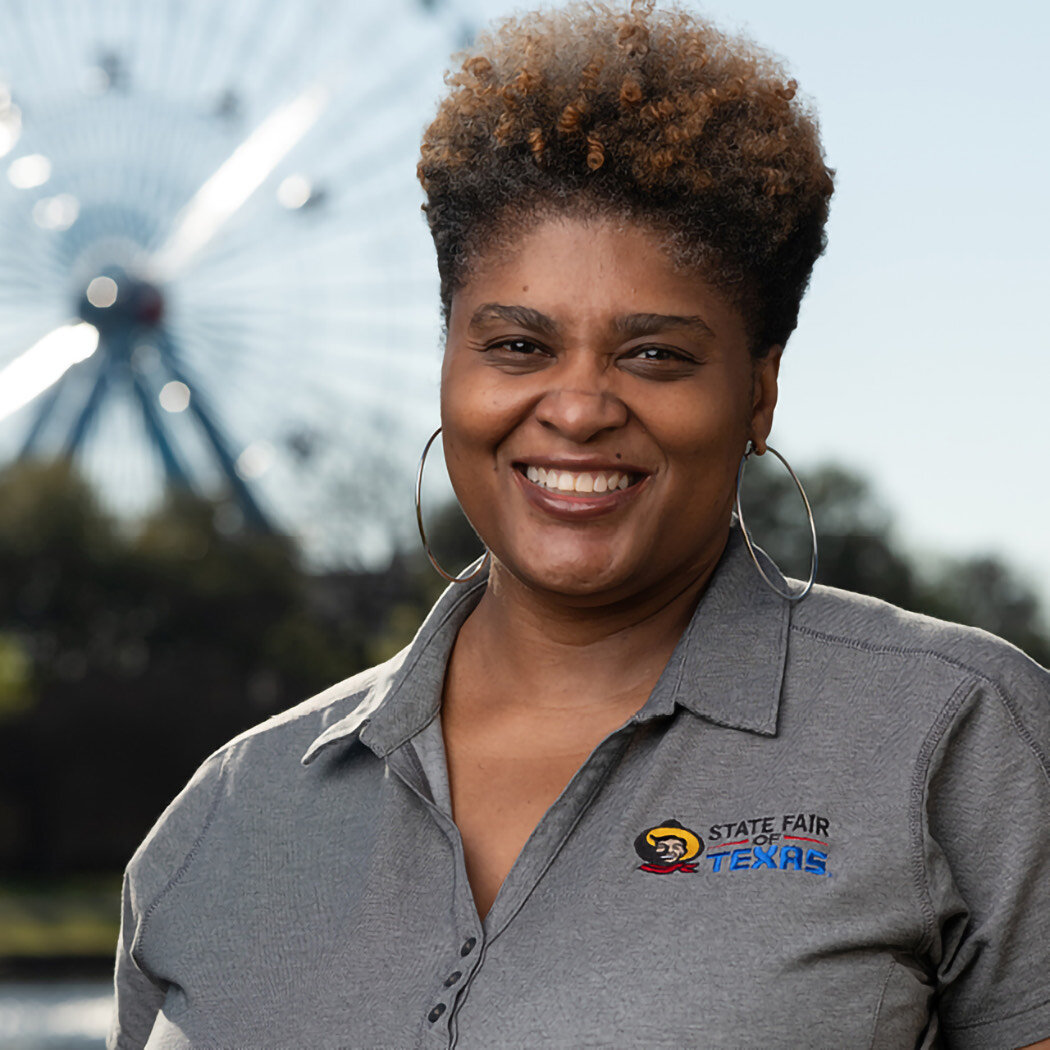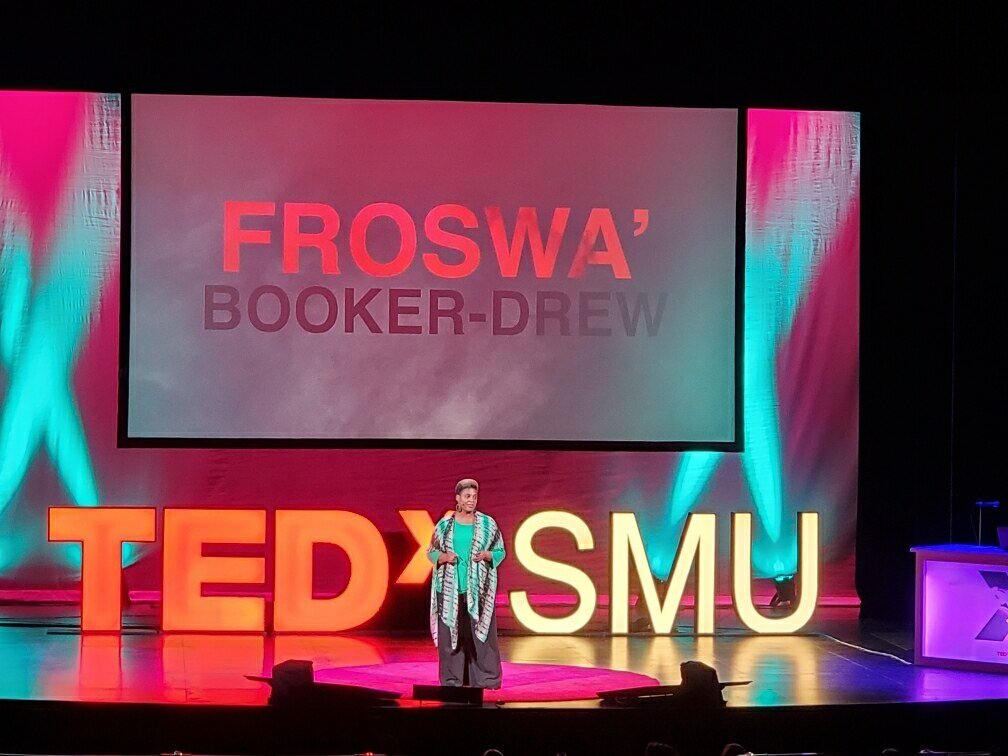Story by Roselle Tenorio. Photos courtesy of Froswa Booker-Drew.
Froswa’ Booker-Drew, PhD, steers the State Fair of Texas as Vice President of Community Affairs & Strategic Alliances, building relationships and strategic initiatives to meet the needs of the South Dallas community. When COVID-19 first appeared in Dallas, Froswa mobilized with other community leaders in the philanthropic, public, and private business sectors. The impact of her contributions are apparent among numerous collaborations including ServeDFW, City of Dallas Ad Hoc Committee on COVID-19 Human and Social Recovery and Assistance, North Texas Cares, and North Texas Giving Tuesday Now. We spoke with Froswa about her work helping nonprofits and communities respond to COVID-19.

COVID-19 has revealed long-standing privilege, disparities, and inequities that exist, leaving our most vulnerable neighbors exposed to a harmful threat. As the data continues to come out from black and brown communities showing increased mortality rates from COVID-19, Froswa urges us to ensure nonprofits already on the ground, with the historical and cultural knowledge, receive the resources they need to serve. COVID-19 is exposing inequitable systems, including some in the philanthropic space where Froswa is making her greatest impact. You may, at first glance, think philanthropy to be exclusively positive, but each day Froswa utilizes her racial justice lens to challenge the sector as it becomes more accessible. “Philanthropy has made it so difficult that even people doing good work cannot access funds,” Froswa explains. “In my opinion, when you think about how a lot of philanthropy started we have to be honest and recognize it is their money too.” Advocating for access to funds that historically reach all the way back to plantation and enslavement of Africans, is the lens shaping Froswa’s perspective. In response to COVID-19, her primary focus is to speak out for what she has long worked for: the inclusion of small and black and brown-led nonprofits for funding consideration.
Froswa cautions, “So often in disasters, larger nonprofits, because they are able to articulate their message well and they have marketing teams and research and development teams. They are in a position to share their message and receive funding whereas small nonprofits are still out there doing the work but they are not receiving resources.” Now more than ever, smaller nonprofits and the black and brown communities they serve cannot afford to be left out. In response, Froswa tapped into her network both at the State Fair and through online platforms to compile a list of small to midsize nonprofits with the following priorities in mind:
-
Sharing with funders so they know of their existence
-
Sharing information about resources such as North Texas Cares with the list of nonprofits
-
Sharing with the City of Dallas for future coordination and collaboration.
Froswa utilizes her capacity-building mindset as she works to get small nonprofits recognized by the city, funders, and others in order to bring more funding and resources to those nonprofits, which would mean increased ability to serve their underserved communities. Again, she cautions not to skip building capacity because for example, when a larger nonprofit asked for her list to be added to 211texas.org she advised against it, knowing that it would overwhelm the small nonprofits without providing additional funding and resources first. Froswa responds, “as much as I want us to be aware of who is doing the work, we cannot exploit these organizations either.” Froswa takes her responsibility as an advocate seriously and she has seen this moment in time as a learning opportunity for herself, funders, the city and the nonprofits to support each other’s work so that they can effectively coordinate. To see her list of nonprofits, visit the website ServeDFW.org, a website developed by the team at Persona Media Co., to find out what resources are needed/provided and where.
Before COVID-19, Froswa was already supporting nonprofits through many of her roles including leading a cohort of nonprofits in partnership with the United Way of Metropolitan Dallas specifically for capacity building. She has led the cohort now in its fourth year and this year narrowed the scope to nonprofits addressing re-entry, which are one of the most unfairly penalized groups as they are released usually with no guarantee of housing and no avenue to obtain housing because of their status. Due to the physical distancing requirements because of COVID-19, there is an even greater shortage of housing as well as other resources like technology and access to the internet; for example Spectrum does not provide service to South Dallas. Despite the challenges, Froswa is inspired by her cohort of ten organizations’ determination to provide a solid foundation for their clients, which she saw firsthand after gathering them virtually to share resources.
Froswa’s TEDxSMU talk on the topic of Proximity+Presence: Social Capital and Polarization. Watch her talk here.
Froswa has always created space for smaller nonprofits to gather and share information and resources but that work is even more important now. She met virtually with 20 small South Dallas, (many that the State Fair of Texas supports) recently, and they discussed the challenge of having long-time clients who are more strained due to the virus and then new clients who are better off but cannot find what they need in the stores or online. As the organizations look to adapt, find resources, and still serve, Froswa is an expert collaborator and coordinator for them. She connected one organization in need of diapers with World Vision, her previous employer, in order to receive pallets of diapers to be distributed in South Dallas.
Froswa’s love and connection to South Dallas extends beyond her current job role. The spirit, people and community of South Dallas reminds Froswa’ of the community of Cedar Grove in her hometown of Shreveport, Louisiana. South Dallas helped shape her early career, which began at Dallas Weekly, the African American Museum, South Dallas Cultural Center, Juanita Craft House, and St. Philips School and Community Center. Each of these organizations further embedded her life into the fabric that makes up South Dallas. Froswa’ is so grateful for everyone that has contributed to her life and career that has made it full circle, including working at the home of Mrs. Juanita Craft who fought to integrate the State Fair of Texas in the 1950’s.
With summer on the horizon, Froswa’ and her State Fair of Texas Community Affairs team has been working on their annual summer youth programming grants. The upended school schedule followed by summer will result in severe learning loss for many students. Last year they funded and provided technical assistance to 17 nonprofits who provide summer programming and they will have a similar amount again this year and they will be ready to provide virtual learning platforms and training to their partners. The grants make up a larger pool of 60 nonprofits that the State Fair of Texas selected in 2019, granting almost a half a million dollars. The majority of those organizations are led by people of color and serve South Dallas in the areas economic development education and capacity building.
The women of the HERitage Giving Circle at the Texas Women’s Foundation.
Dr. Booker-Drew also helped to launch The HERitage Giving Circle long before COVID-19 began. As a thriving part of the Texas Women’s Foundation, the giving circle continues to encourage philanthropy in the African-American/Black community, contribute in a strategic and meaningful way, and bring a new source of funding to nonprofit organizations serving African-American women and girls throughout the North Texas area. Akilah Wallace and Dr. Halima Leak Francis brought Froswa’ and other women together to found HERitage three years ago and has granted bi-annually since then. Thankfully, for 2020, their timeline for granting was already planned during the month of March, so their response to COVID-19 was rapid. The savvy women of HERitage made their grants unrestricted operating support so that the six small nonprofits they awarded could be flexible in their response to the pandemic. Froswa’ loves HERitage and is proud of the work they do because it changes the narrative of philanthropy to center black women. This kind of giving reminds Froswa’ of her family members who cooked for those in need and visited the sick despite having limited resources as well.
>
“I’ve heard of people with more time on their hands now, but they must not be involved with a nonprofit.”
Extending her giving impact, Froswa’ also sits on the Communities Foundation of North Texas’ North Texas Giving Day Committee, which has launched North Texas Giving Tuesday NOW in response to many nonprofits losing donation and revenue streams because of COVID. Every organization that had an active page during the last North Texas Giving Day is eligible to participate. The North Texas Tuesday Now site is a great way to learn more about the needs of over 30,000 nonprofits in the North Texas region. Froswa’ mentioned how much busier she has been since COVID began and she attributes it to her involvement in nonprofits. “I’ve heard of people with more time on their hands now, but they must not be involved with a nonprofit,” she says with a smile.
The current situation has many community leaders hyper-focused on long-standing issues including how to coordinate a crisis response. For Froswa’ the question raised in her mind is, “Who is responsible for the coordination of nonprofits?” Despite the challenge of more than 10,000 nonprofits in the city of Dallas, she believes that there has to be a way to do a better job of bringing everyone to the table and coordinating together. Froswa’ is hopeful that during the COVID response others will begin to raise the same question and find an answer together. Froswa’ is already responsible for coordinating through the State Fair of Texas the nonprofits of 75210, 75215, and 75223, which are their immediate neighbors and have begun to stretch beyond to other Southern Dallas nonprofits that serve South Dallas.
If this story has inspired you to support the North Texas nonprofit community, visit our Support Nonprofits During COVID-19 page to learn how you can get involved!

